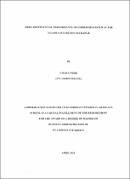Debt and financial performance of companies listed at the Uganda securities exchange
Abstract
This study was set to investigate the effect of debt on the financial performance of Listed
companies at the Uganda Securities Exchange for the period of 2013-2018. Specifically, the
study examined the effect of short-term debt on financial performance the effect of long-term
debt on financial performance and the moderating effect of firm size on the relationship between
debt and financial performance of listed non-financial firms at the Uganda Securities Exchange
for the period of2013-2018. The study utilized panel data generated for 6 years (2013- 2018)
among 8 non-financial firms. Random Effect (RE) panel econometric analysis was used to
analyze the effects of debt on financial performance of 8 non-financial firms listed at the Uganda
Securities Exchange between 2013 and 2018. Empirical results showed that short-term debt has
negative and insignificant effects on ROA (Beta = -0.0854. p value =0.571) :md ROE (Beta=-
0.3798 1, p value =0.564) while long-term debt has negative and statistically significant effects
on ROA (Beta= -0.3833, p value =0.002) and ROE (Beta = -0.7908. p value =0.004). Firm size
was found not to have a statistically significant influence on the effect of short-term debt and
ROA (Interaction STD*Fsize =0.0322, p value =0.22 1) and ROE (Interaction STD*Fsize
=0.02175, p value =0.331) while a statistically significant influence was found on long-term debt
on ROA (Interaction LTD*Fsize = -0.0193, p value =0.000) and ROE (Interaction L TD*Fsize
=0.0 1441 , p value =0.000). The study, therefore, concludes that with firms of large asset base,
long-term debt accumulation is beneficial. Also, the findings reinforce the need to consider other
forms of capital than borrowing to impact profitability levels.
Key Words: Short-term debt, Long-term debt, Return on Assets, Return on Equity

